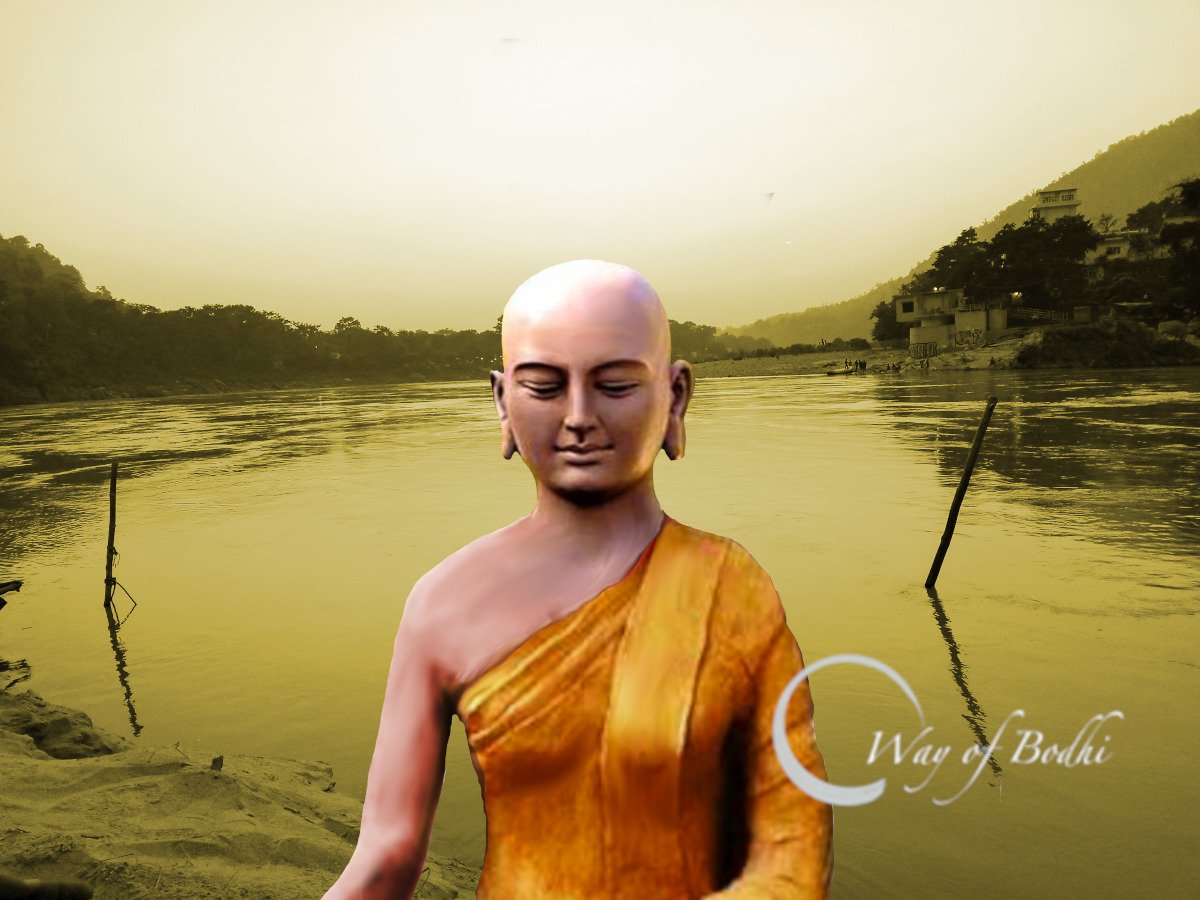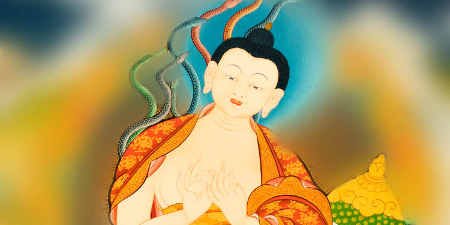The Liberation Story of Punnika, a Girl from an Oppressed Caste
Here is the liberation story of Punnika Theri. A girl from an oppressed caste, her life transformed upon listening to the Buddha. Later, her wisdom transformed the Brahmin Udakasuddhika. The below narration is based on the liberation songs of Punnika and Udakasuddhika. The songs are present in Therīgātha, a collection of the liberation songs of the Buddha’s female disciples.

A freezing winter morning. Punnika was heading as usual to the nearby Achiravathi River. The gentle rays of the rising sun were seeping through the dense fog that filled the streets of Sravasti. Birds were yet to takeoff from their nests. But Punnika’s mind was soaring high. A new awakening was dawning on her.
Countless times she has trodden the same streets. In her harsh subordinate life, those pathways were nothing but the repetitions of the same drudgery; until yesterday! From the early childhood, she was a domestic help in a merchant’s house. For generations, her family had no choice but to do the same chores. She knew nothing beyond the bondage into which she was born.
But that morning was different. The words of the Buddha that she heard the previous evening kept seeping into her heart like the rays of the dawn through the fog. In the radiance of that wisdom, she saw a fresh beauty all around.

The Buddha was staying with his monks in Jetavana, a beautiful garden of Sravasti. Though inhabited by thousands of monks, an air of profound silence filled Jetavana. The visitors were always amazed about that. After listening to the words of the Buddha, they too returned with peace pervading their hearts.
The stories on the life-changing discourses given by the Buddha reached Punnika’s ears too. And one day, she went to Jetavana to listen. That day, the Buddha gave a discourse which later became renowned as the Simhanada Sutta. Those were the words that opened new vistas in Punnika’s world. The excitement and determination to travel through those new avenues of freedom and happiness was awakened in her.

The next morning, again, Punnika reached the river bank. As usual, a Brahmin was standing neck-deep in freezing water, shivering and performing his purification bath. This Brahmin was known in the town as Udakasuddhika as he considered performing such bathing rituals in the early morning as his means of salvation. Punnika felt sorry for him when she saw his suffering. In her new awakening, the servant girl forgot the customs of the land and boldly asked the Brahmin,
“O Brahmin, Me Punnika, a domestic help at the merchant’s bungalow. I come to the river so early in the morning everyday, in spite of the freezing cold, because I have no other way. It is my job to fetch water.” She continued, “Otherwise my mistresses will scold me and beat me. But, O Brahman, what are you afraid of, standing in the water like this, with trembling limbs, in this cold?”
In those days in India, it was totally uncommon and unheard of for a girl belonging to an oppressed caste to face a Brahmin, let alone question him. With astonishment, the Brahmin replied,
“Hey girl, you have been seeing this for years, and you must have heard about it too. Why this question? Taking bath in this holy river of Achiravathi will wash away all stains of evil deeds. It holds good for both young and the old. I, who do this deed, thereby wash away all my sins.”
Punnika: “Who taught you this? Isn’t this merely word of mouth that goes from ignorant to ignorant? ”
Udakasuddhika: “What an insult! You, a mere servant girl of the lowest caste; You are questioning the knowledge that we have inherited from our ancestors for generations.”
Punnika: “I am sorry, I still do not get it. If a sin can be washed away by bathing in a river, then don’t you agree that hunters, butchers, thieves, robbers, and executioners can take a dip in this river and wash away all their sins and go to heaven?”
Udakasuddhika: It is possible for sure. If they do it, they too will be cleansed. But they are not ready to undergo such hardships. They don’t bathe in this holy river at every daybreak.”
Punnika: “There are so many fishes, frogs, tortoises, water snakes, and crocodiles living in this river throughout the day and night. So they must be very sacred! Washing away their sins day and night, throughout their life, they must be going straight to heaven. Hence, aren’t these creatures superior to you?”
On hearing this, Udakasuddhika became a bit perplexed.
Punnika continued, “If all your sins are washed away by this river, are not your merits too washed away in the same manner?”
Udakasuddhika began to feel that there was some truth in what Punnika was saying.
Feeling mercy in the plight of Udakasuddhika, Punnika continued compassionately, “Fear leads you to the river. Suffering frightens you. You have the right desire to get rid of your suffering. But you do not know the extent of suffering in this Samsara, its root cause, or the way to get rid of it. The habits and karma that are accumulated in the mind through thoughts, speech and actions, cannot be washed away by ablution water. Prince Siddhartha Gautama found a way out of suffering. Having freed himself from karma, and awakening to wisdom, he became the Buddha. Yesterday, I was fortunate to hear that truth from Bhagavan Buddha. That changed my world. Today, I see a new world and a new way. O Brahmin, I say this out of concern for you. Please do not torment your body in this manner. Save your body from the freezing cold. “
Punnika’s words opened the doors of wisdom in the Brahmin. He understood the utter fruitlessness of his rituals. Taking off his upper robe and holding it in his hand, he told Punnika, “O, Punnika, noble girl of wisdom, you are quite right. Now, I understand the futility of my actions. You brought me to the right noble path. I am indebted to you. As a reward for opening my eyes, I offer you this special robe I used for ablution rituals.”
Gently refusing the robe, Punnika said, “Let the robe remain with you. I do not need it. I have only this to say: If you are afraid of suffering, please put your efforts in abstaining from all evil deeds, both in public and private. Bathing in the river is not the virtuous deed. Whatever deed brings happiness and wellbeing to others is what you can firmly regard as a virtuous deed. Whatever deed cause suffering and grief to others is the evil deed. They in turn become the cause of our sorrow in the future.”
“Bhagavan Buddha preaches: Abstain from all evil deeds. Bask yourself in virtuous deeds. Always purify the mind.” Punnika continued, “The suffering of Samsara is not overcome by wearing any special robe or bathing. The ocean of suffering can be crossed over by always watching one’s own mind and taming it. This is possible by taking refuge upon the Buddha and practicing the Noble Eight-fold Path of the Buddha. Nirvana is within the reach of all of us.”
Having purified in views by the nectar like speech of Punnika, inspired by the Buddha, Udakasuddhika decided to meet the Buddha and take refuge upon him.

The news of the transformation of Udakasuddhika, the Brahmin by Punnika the domestic help, spread all over the land. Meanwhile, she developed a strong urge to join the Buddha’s Sangha and traverse the path of Nirvana. Without much delay Punnika went to the Buddha and joined as a Bhikshuni (nun). Through listening to the teachings of Buddha and practicing of the Way, all the bonds of her mind were loosened, and she achieved complete liberation. She became Arihantha (Arhat) and was renowned as Punnika Theri (The Elder Punnika).
Meanwhile, Udakasuddhika too joined the Buddha Sangha and became a Bhikshu (monk). Having practiced the Way, he too attained complete liberation and became an Arhat. Then he sang his story of liberation,
“Before, I was merely called a Brahmin by birth.
Today, I have become a true Brahmin!
Endowed with the three knowledges (trividya), I have become peaceful!
Having bathed by wisdom, I am purified!”
Udakasuddhika was earlier a Brahmin in name because he was born in a Brahmin clan and followed their rituals. But did not know Brahman. (The Buddha sometimes used the word Brahman as a synonym for truth. It is in the sense of the single essence, the idea of truth attributed to Brahman by the later Vedantins.) Later, having realized the genuine truth of Samsara through the practice of the Noble Eight-fold Path of the Buddha, Udakasuddhika became a Brahmin in the true meaning of the word (one who knows Brahman, the truth). One does not become a knower of truth by the birth in a caste or race. The words of Punnika, inspired by the teachings of the Buddha, could do what the ablution water of the holy river could never do. Udakasuddika’s mind was bathed clean of wrong views and the recognition of the Way emerged in him through the words of Punnika, the domestic help who was born into an oppressed caste. According to the Brahmanical system, the trividya is the verbal knowledge of the three Vedas passed down through ancestral lineage. In contrast, the trividya that Udakasuddhika sang in this song are the three direct insights that lead to liberation. Through following the Noble Eight-fold Path, Udakasuddhika attained these three insights – (i) clear recollection of previous births, (ii) direct seeing of the brith, death and rebirth of all sentient beings, wandering in the ocean of Samsara, propelled by karma, (iii) the experience of pacification of all fermentations of mind.
The truth cannot be discerned through speculation and hearsay. Only through direct insight into the root cause of suffering of Samsara can one free oneself from it and attain Nirvana.
This incident from Therīgātha is a good example of how the teachings of the Buddha transformed both the individuals and the society.

Therigatha is an anthology of liberation songs of the female disciples of the Buddha. The above writing is based on the account of Punnika Theri in Therigatha and the commentary to it called Paramathadeepani written by Acharya Dhammapala.
*** *** ***
For this article in other languages – Malayalam Post
- Like a bird flying through the vast expanse - September 21, 2021
- The Liberation Story of Punnika, a Girl from an Oppressed Caste - March 31, 2021
- Ancient Buddha Statues of Kerala - October 11, 2018



This is a very inspiring story. Thank you.